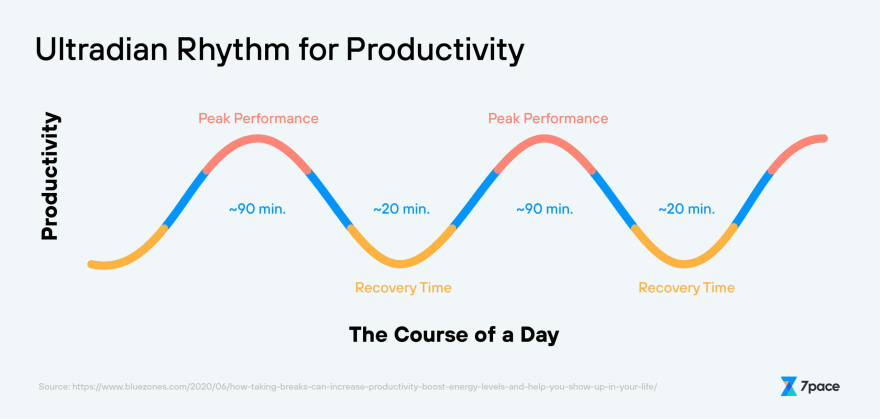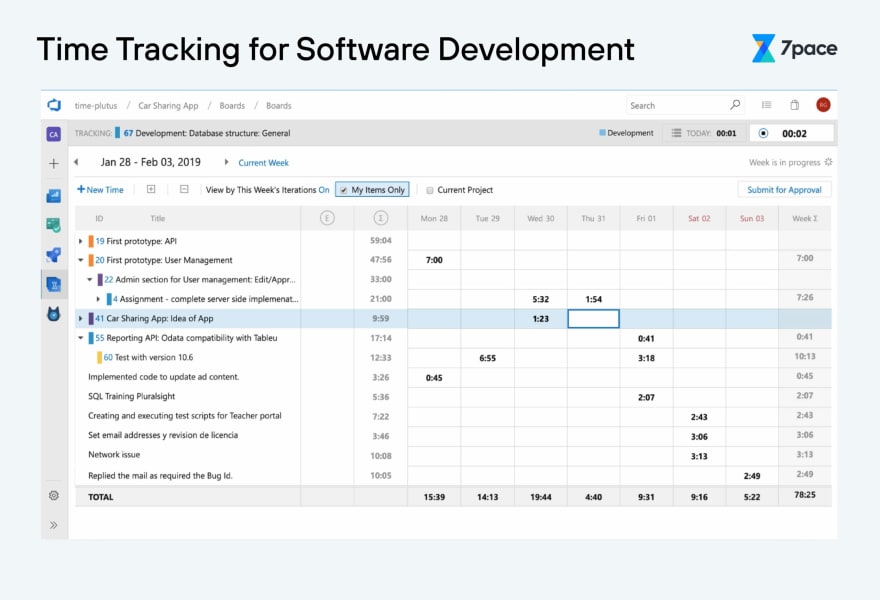Punching the clock.
Time monitoring.
Real-time surveillance.
There are a lot of terms — and tools, unfortunately — out there for tracking time that are less than positive.
And it’s not hard to see why when time tracking is more and more often being used as a means to “boost productivity” by toxic companies and managers, especially as remote work becomes more the norm and less the outlier.
But the thing they don’t get is that time tracking really isn’t a great tool for determining how productive you or your team are (In fact, here’s a much better way to measure productivity.).
What time tracking is a great tool for is self-improvement.
Hard to believe?
We certainly get how it can be for developers who are only familiar with the aforementioned noxious workplaces.
All we ask is that you put any preconceived notions aside for the length of this article and let us tell you about the wonderful world of optimizing yourself via healthy and effective time tracking habits.
Beware the Trap of Over Optimizing Your Time
Wait, the “trap” of optimization?
But didn’t we just say the whole point of this article is to teach you about optimization?!
Yes, we did promise optimization — and optimization we will deliver. What we won’t be doing is hyping up over optimization of your time.
In a world where both the fear of and the solution to being “inadequate” is sold to you in every social media scroll and visit to the front page of Medium.com, we want to warn you against the trap of optimizing your time in oblivion.
People don’t often use the phrase “over optimization,” but we all know it when we see it.
Colleagues one-upping each other over who gets the least sleep every night so they can hit the gym at 4 a.m. before cooking a four-course vegan breakfast and making it to their full-time job by 6.
The so-called influencers using their platforms to brag about how much “sacrifice” and “hustle” it took them to achieve their goals (and then turning around and selling you their success “secrets” for a reasonable fee!).

Over optimizing your time so that there’s none left for the things that recharge you — family time, passion projects, sleep — isn’t going to get you much in the long run besides anxious, exhausted, distracted, and maybe even fired.
That’s not the mentality we’re talking about here.
This article, just like our time tracking software and our company as a whole, is all about helping you better understand a paramount part of life — how you spend your time living it — so that you can make informed decisions on where to make improvements and optimizations in order to meet your goals.
With that out of the way, let’s explore several leading ways that time tracking can help us improve our lives and how exactly to use time tracking software to make it happen.
5 Ways Time Tracking Can Assist In Self-Improvement
If you’ve been traumatized in the past by managers who breathe down your neck about “punching the clock,” it can be hard to see the upsides of tracking your time.
However, there are many ways in which tracking time can help you improve yourself both at home and at work.
Overcome Procrastination
People who work within a team are probably familiar with all the administrative and back-and-forth communication tasks that really don’t take all that long to do yet somehow always seem to pile up into a mountain of dread if ignored.
That’s where David Allen’s popular “two-minute rule” comes in. If you come across a task that’s relevant to what you’re currently working on and you can get it totally off your plate in the span of two minutes, complete the task immediately.
The two-minute rule should help you avoid all the wasted time and mental energy that comes with filing tasks away to re-evaluate and complete later. On a larger scale, it may also help you overcome your fear of tackling your to-do list and create momentum on other, bigger tasks you’ve been putting off.
The thing is, you’ll never know how long any given task will take if you don’t track how long it takes you to do it a few times. After tracking your time for a bit, you’ll develop a skill for realistically estimating how long certain things should take you and if you should tackle them right away or not.
Prioritize Your Tasks to Prioritize Your Life
At its core, time tracking is a way to understand how you spend the finite minutes you get in life.
When you have a clear understanding of how many of those minutes certain tasks take, you can take a hard look at what’s worth your life’s time and what isn’t.
You’ll likely learn as you track your time more closely that the things you spend the longest doing aren’t the things you would say are the most important in your life. And if that’s the case, you’ll know where to start when it comes to optimizing how you’re getting certain things done (switching from manual to automated processes, hiring another set of hands) and deprioritizing other things.
In this way, time tracking plays a role in prioritizing not just your tasks but ultimately your life over your to-do list.
Become More Aware of Your Peak Productivity Periods
We know you were waiting for it — our nerdy moment of the day!
Meet ultradian rhythms: Biological cycles that take place over the course of 24 hours (as opposed to circadian rhythms in which only one cycle is completed per day).

Research on ultradian rhythms in humans seems to indicate that our bodies go through somewhat regular, daily cycles in which they’re predisposed to either rest or productivity.
This means that if you can slice and dice your time tracking information — more on the importance of this later — to understand how long certain tasks take you and at what time of day you’re doing them, you should be able to identify your ultradian rhythms and plan the best time of day to really get stuck into deep tasks and when it’s better to tackle lighter work like finding the best animal gifs.
Plan Your Days More Effectively
As we mentioned above, tracking your time is majorly helpful in deciding what tasks you can get done in the moment to beat back personal and workplace procrastination and overwhelm.
On the flip side, it’s also helpful in deciding what to do with all those tasks that will take over two minutes but still have to get done at some point.
When you have a good idea of how long key duties will take as well as a grasp on your productive periods throughout the day, you can lay out a day’s worth of work in a way that will improve its chances of actually getting done.
Grow Your Skills — And Uncover Skill Gaps
Getting faster at completing a task is usually a reliable way to show you’re getting better at it, but knowing you’re getting faster is only possible if you’re committed to regular time tracking.
If you find that you’re getting better and quicker at a specific task but the workflow that it’s part of doesn’t seem to be moving any faster, you may have uncovered an area where you or others on your team can uplevel in other skills and improve the entire process.
How to Effectively Track Your Time for Continuous Self-Improvement
Knowing how to physically track your time is the final step in optimizing your life by using time tracking.
Make the Task of Time Tracking Easy
We’re lucky to live in an era when lots of great software exists to automate menial tasks so we can spend more of our valuable time on tasks that are important to us.
One such piece of great software for the workplace is our very own 7pace Timetracker, a time tracking solution that works seamlessly with Azure DevOps tools (and will soon work with Github, too) to automate time tracking by either work item or issue.

What sets 7pace Timetracker apart from similar tools? It’s easy to integrate into your workflow, it’s easy to use to record time, and it’s even easy to generate reports from so you can get a deep look into how you’re using and optimizing your time.
Make Time Tracking a Habit
Time tracking is only truly effective when done on a regular basis. However, we all know how hard it can be to turn a new goal into a long-lasting habit.
If you need a little help, here’s a quick version of our own recommended process for developing a habit:
Step 1: Start small
Step 2: Connect a new habit to a habit you already perform regularly
Step 3: Accept that you’ll face roadblocks
Step 4: Reward yourself when you stick with it
Step 5: Make sure your surroundings set you up for success
Step 6: Keep visible track of your progress
Step 7: Find an outside source to hold you accountable
Step 8: Be open to adjustment if something isn’t working
Step 9: Always prioritize progress, not perfection
Make Your Time Tracking Data Feel Real
Somewhat paradoxically, it’s been found that when data is too easy to digest we tend to treat it the same way we would any passive piece of entertainment: Interesting, but ultimately unimpactful.
If you really want to achieve self-improvement by way of time tracking, letting what you learn flow in one ear and out the other simply won’t do.
So while it should be easy to track your time and generate reports from your time tracking software (both things 7pace delivers on), don’t take it easy on yourself when it comes to making it real. Study how you spend your time, manipulate the data in different ways to see various outcomes, and finally experiment with how you spend your time to see how your real life moves the needle and impacts all those charts and numbers.
How Will You Track Your Time on the Path to Improvement?
When removed from the controlling hands of overbearing managers and companies, tracking your time is a proven solution for improving yourself and optimizing your life (within reason).
All it takes is finding and actually making use of the right time tracking tool for your life and work style.
7pace Timetracker is the only integrated, professional time management solution for teams using Azure DevOps and GitHub.







Top comments (0)